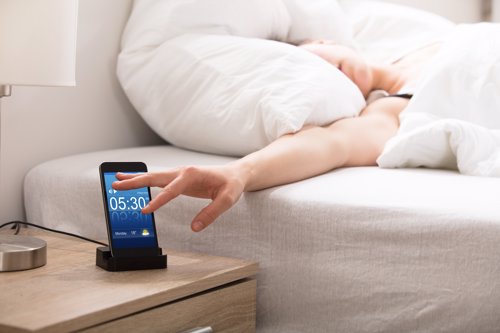
News
The gut microbiota and sleep
With the recent arrival of British Summer Time and our bodies adjusting to the ‘loss’ of an hour’s sleep, what better time to see what, if any, effect sleep has on the human gut microbiota.
A study by Smith and colleagues found significant correlations between the gut microbiota, sleep and inflammatory markers in twenty-six male participants.1 Increased microbiota diversity, as determined by richness, Shannon diversity and inverse Simpson diversity, were significantly associated with ‘sleep efficiency’ (total sleep time compared to the total amount of time in bed) (P=0.001, P=0.001, P=0.009 respectively). Furthermore, Shannon diversity was also negatively correlated with ‘wake after sleep onset’, a measure of sleep fragmentation. Overall, these results indicate that increased microbiota diversity is associated with improved duration and continuity of sleep. These correlations were also observed for specific phyla. Sleep efficiency was positively correlated with increased Bacteroidetes species diversity (P=0.03) and richness (P=0.05), and Firmicutes species richness (P=0.02). And, wake after sleep onset was negatively associated with Bacteroidetes species diversity (P=0.02).1
In addition to identifying a relationship between the gut microbiota diversity and sleep quality, Smith et al. measured IL-6 to try and identify the mechanism. IL-6 was positively correlated with microbiota diversity (richness P=0.001, Shannon diversity P=0.011, inverse Simpson diversity P=0.009), total sleep time (P=0.019) and time in bed (P=0.032). These results contradict previous research which has shown that increased IL-6 is associated with poor sleep quality3-5, however, IL-6 has a sleep inducing effect and therefore levels may rise to coincide with sleep onset, which could in part explain the relationship that was observed in this study.1
Overall, the findings from this study indicate that IL-6 correlate with gut microbiota diversity and the sleep measurements, although the order of these relationships remains unknown.
Psychological stress can result in sleep disturbances. Using an academic stress model, based on medical students due to undertake an examination to progress to the next grade, researchers have investigated if consuming a fermented milk drink can have an effect on sleep quality.2
In a double-blind, placebo-controlled, parallel-group trial, 98 students consumed either 100ml L.casei Shirota fermented milk (1x109 cfu/ml) or 100ml placebo milk, once a day, for 11-weeks. Sleep quality was assessed using both an objective (electroencephalography ‘EEG’) and subjective (Oguri-Shirakawa-Azumi ‘OSA’ sleep inventory) measure.2
In both groups, their reported sleep quality worsened significantly in the run up to the exam (P<0.01). However, looking at the factors that contribute to sleep quality individually, those who consumed L. casei Shirota reported feeling significantly less sleepiness on rising (P<0.05) and slept for longer (P<0.01) compared to the placebo group. Additionally, results from the EEG found that those who consumed L. casei Shirota fell asleep quicker (P<0.05 Vs baseline), had an increased proportion of N3 sleep (deep sleep) (P<0.05 Vs placebo; week 9) and an increased delta power (index of sleep intensity) (P<0.05 Vs placebo).2
Overall, findings from both studies indicate that there is a relationship between the gut microbiota and sleep quality, and dietary interventions that interact with the host’s gut microbiota may be a strategy to help maintain sleep quality during periods of acute stress. However, the exact mechanisms are yet to be determined and warrant further investigation.
References
1. Smith et al. (2019) PLoS ONE 14(10):e0222394.
2. Takada et al. (2017) Beneficial Microbes 8(2):153-162.
3. Vgontzas et al. (1997) Journal of Clinical Endocrinology and Metabolism 82(5):1313-1316.
4. Vgontzas et al. (1999) Journal of Clinical Endocrinology and Metabolism 84(8):2603-2607.
5. Poroyko et al. (2016) Science Reports 6:354405.
20/04/2020
